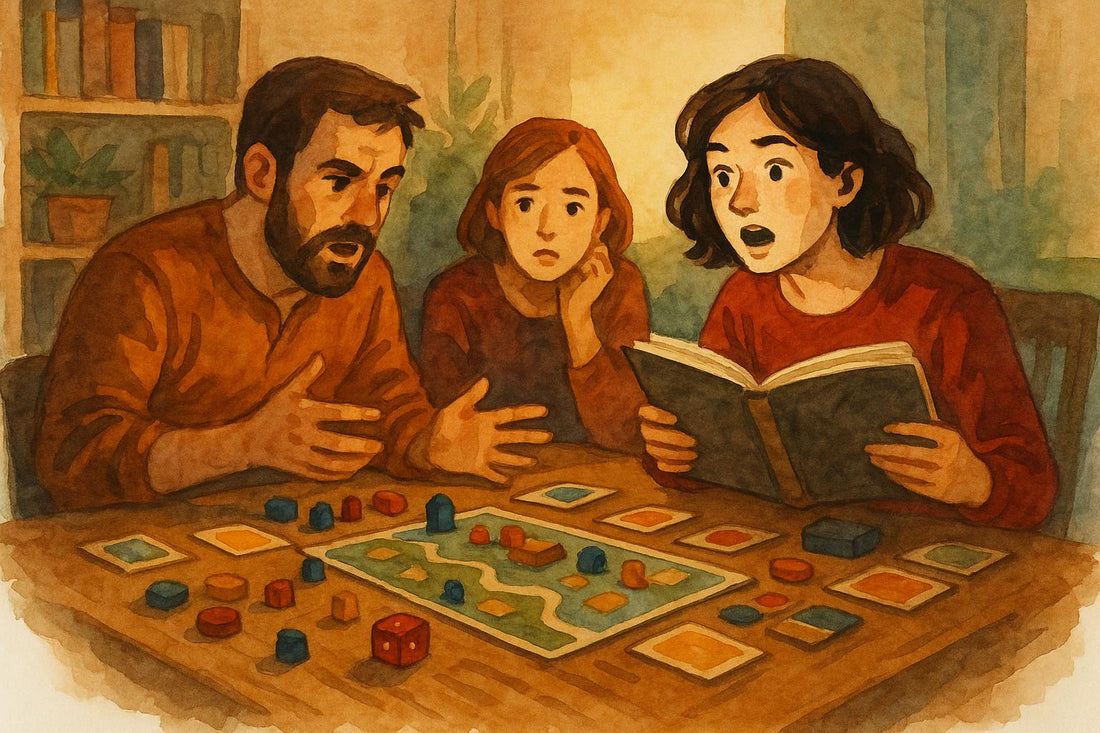
Top Narrative-Driven Tabletop Games
Share
Narrative-driven tabletop games turn game nights into storytelling adventures. These games combine decision-making, character growth, and social interaction to create engaging, shared experiences. Whether you're navigating a fantasy world, solving mysteries, or diving into political satire, these games offer something for everyone. Here's a quick look at some standout titles:
- Sleeping Gods: Open-world exploration with branching storylines and a save system for long campaigns.
- Gloomhaven: Tactical combat and evolving narratives with character progression and a reputation system.
- Roll Player Adventures: Focuses on character creation, with choices affecting the story and moral dilemmas shaping outcomes.
- Vagrantsong: Episodic storytelling set in Depression-era America, with flashback mechanics revealing character backstories.
- The Elder Scrolls: Betrayal of the Second Era: Modular quests and faction dynamics inspired by the beloved RPG universe.
- Red Tape by MINIFINITI: A political satire game with reverse engine-building mechanics, where strategy and humor collide.
These games vary in complexity, campaign length, and social focus, making it easy to find the right fit for your group. Whether you prefer cooperative storytelling or competitive gameplay, these titles deliver memorable sessions filled with choices that matter.
Quick Comparison
| Game | Campaign Length | Player Choices | Replayability | Social Focus |
|---|---|---|---|---|
| Sleeping Gods | Long | High | High | Collaborative storytelling |
| Gloomhaven | Very Long | High | Very High | Team-based combat |
| Roll Player Adventures | Moderate | Medium | Moderate | Character-driven |
| Vagrantsong | Moderate | Medium-High | Moderate | Immersive atmosphere |
| The Elder Scrolls: Betrayal... | Moderate | High | High | Competitive & cooperative |
| Red Tape | Short | High | High | Negotiation & strategy |
These games cater to different playstyles, from epic campaigns to quick, socially charged experiences.
Best Story Board Games of All time
Best Narrative-Driven Tabletop Games
These tabletop games deliver immersive storytelling experiences, combining creative mechanics with evolving narratives that keep players engaged.
Sleeping Gods
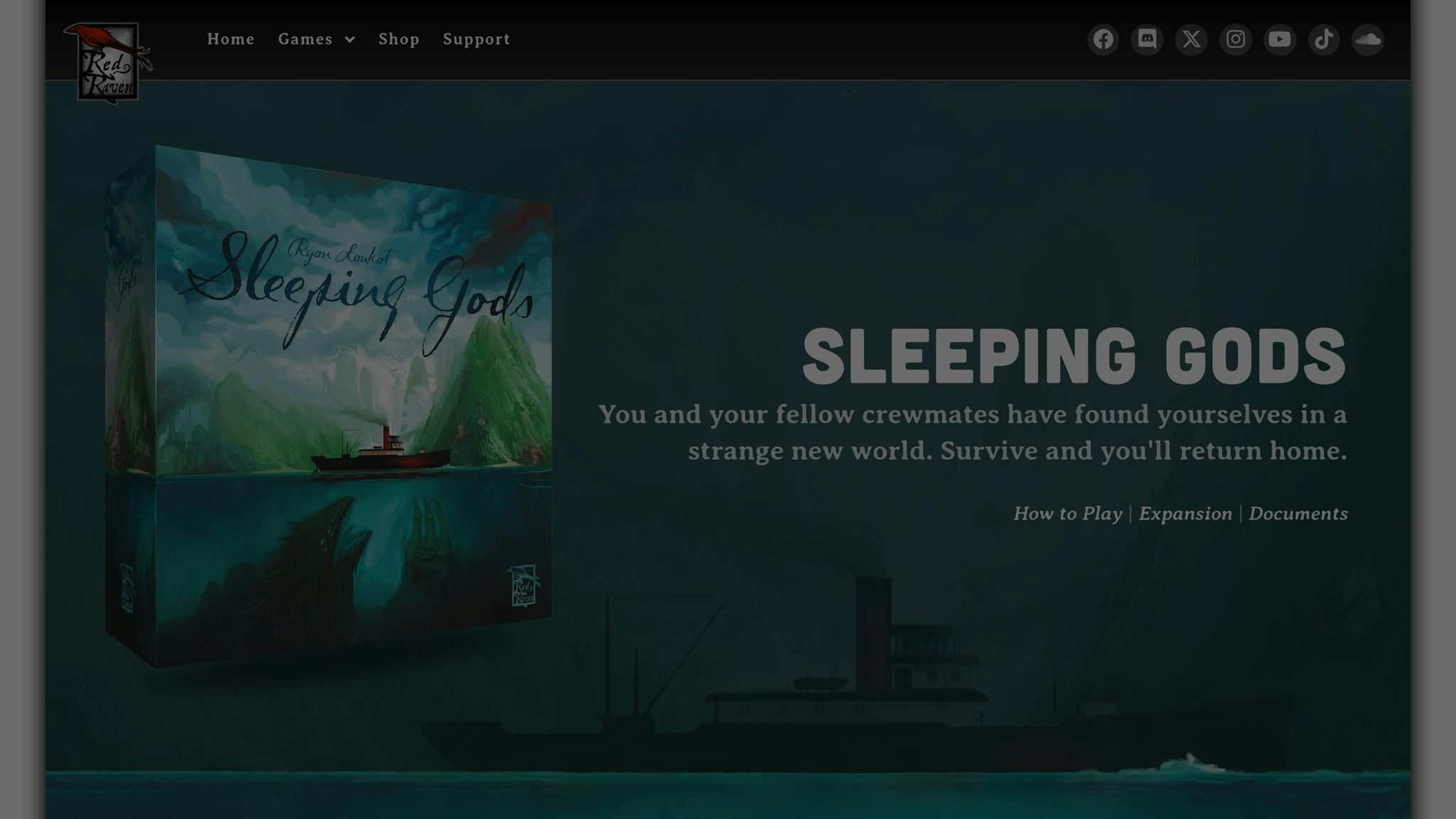
Sleeping Gods transforms your gaming table into a sprawling, open-world adventure. Players take on the role of the captain of the steamship Manticore, navigating mysterious islands and meeting intriguing characters. The game’s world feels alive, with every decision shaping the unfolding story.
What sets Sleeping Gods apart is its keyword system, which tracks triggers to unlock new storylines and events. This creates a web of interconnected narratives where discoveries in one session ripple into future adventures. Plus, the save system makes it easy to pause your campaign and pick up exactly where you left off, even weeks later.
From negotiating with islanders to solving puzzles and engaging in combat, every encounter influences your crew, your ship, and the world around you. This dynamic approach has inspired similar mechanics in later games.
Gloomhaven
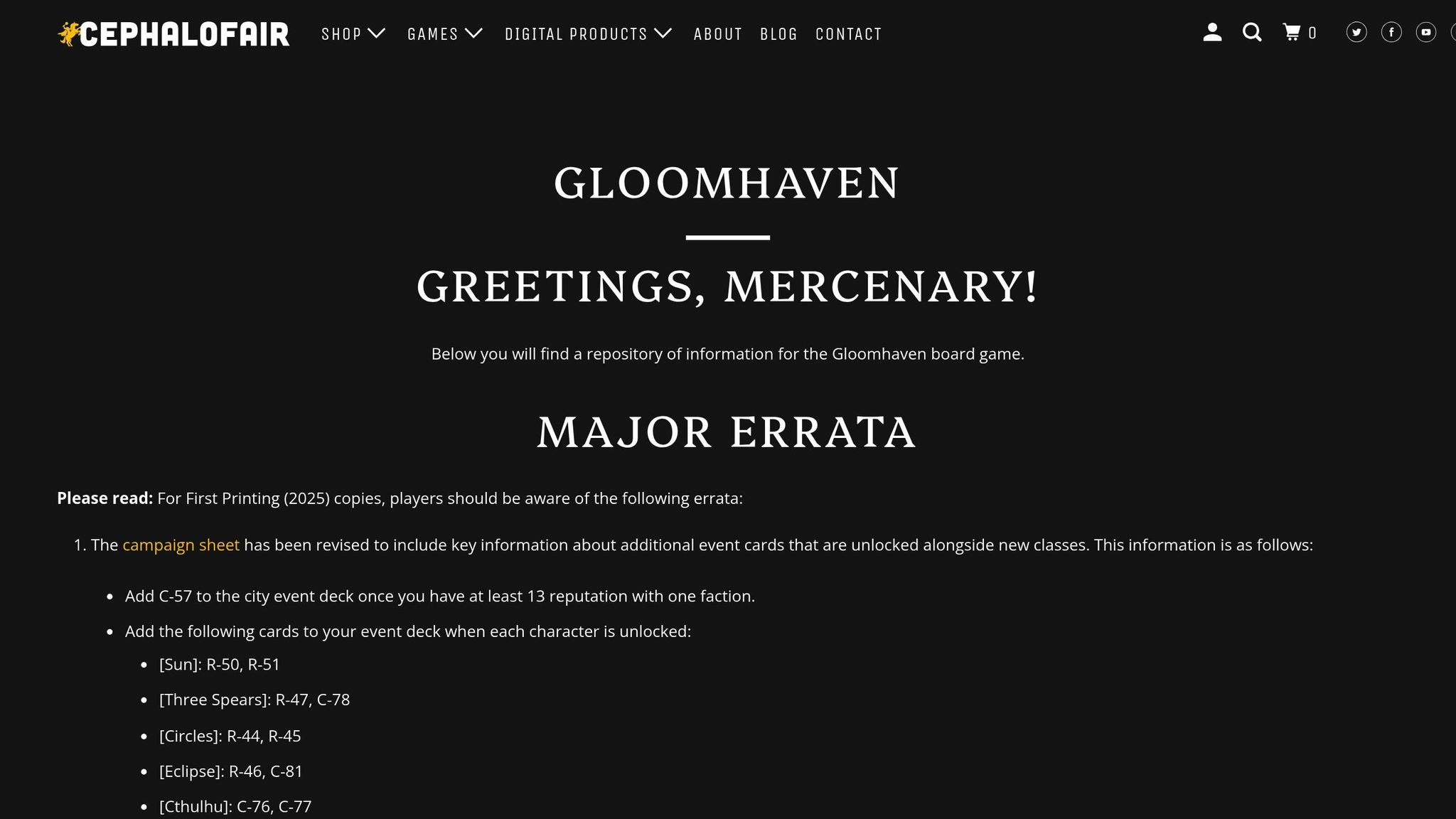
Gloomhaven offers a richly persistent world filled with surprises and branching storylines. Across dozens of scenarios, players encounter sealed envelopes containing new classes, story arcs, and twists that keep the campaign fresh.
The game’s reputation system ensures that every decision has weight, reshaping the campaign’s trajectory. Characters even retire over time, marking the end of one arc and the beginning of another, adding layers to the evolving narrative.
Roll Player Adventures
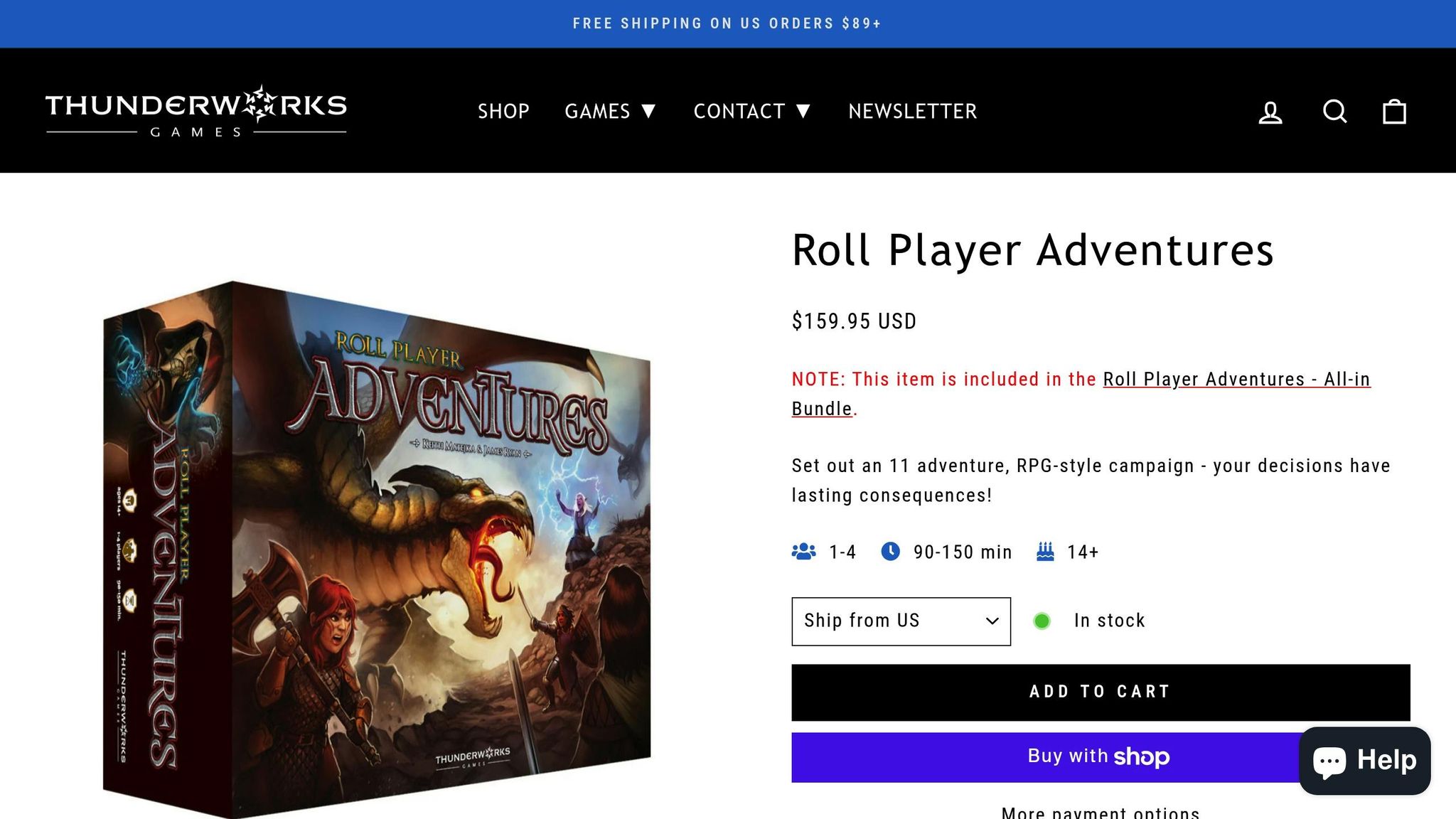
In Roll Player Adventures, character creation becomes an integral part of the story. Dice rolls determine your attributes, which directly influence the options and dialogue available throughout the campaign.
The game’s adaptive storytelling ensures that your character’s skills and background shape how challenges are resolved. For example, a charismatic character might talk their way out of trouble, while a rogue could rely on stealth to find a completely different solution. This flexibility keeps the narrative fresh and personal.
Moral dilemmas also play a significant role, forcing players to make tough choices that affect relationships with NPCs and open - or close - new story paths.
Vagrantsong
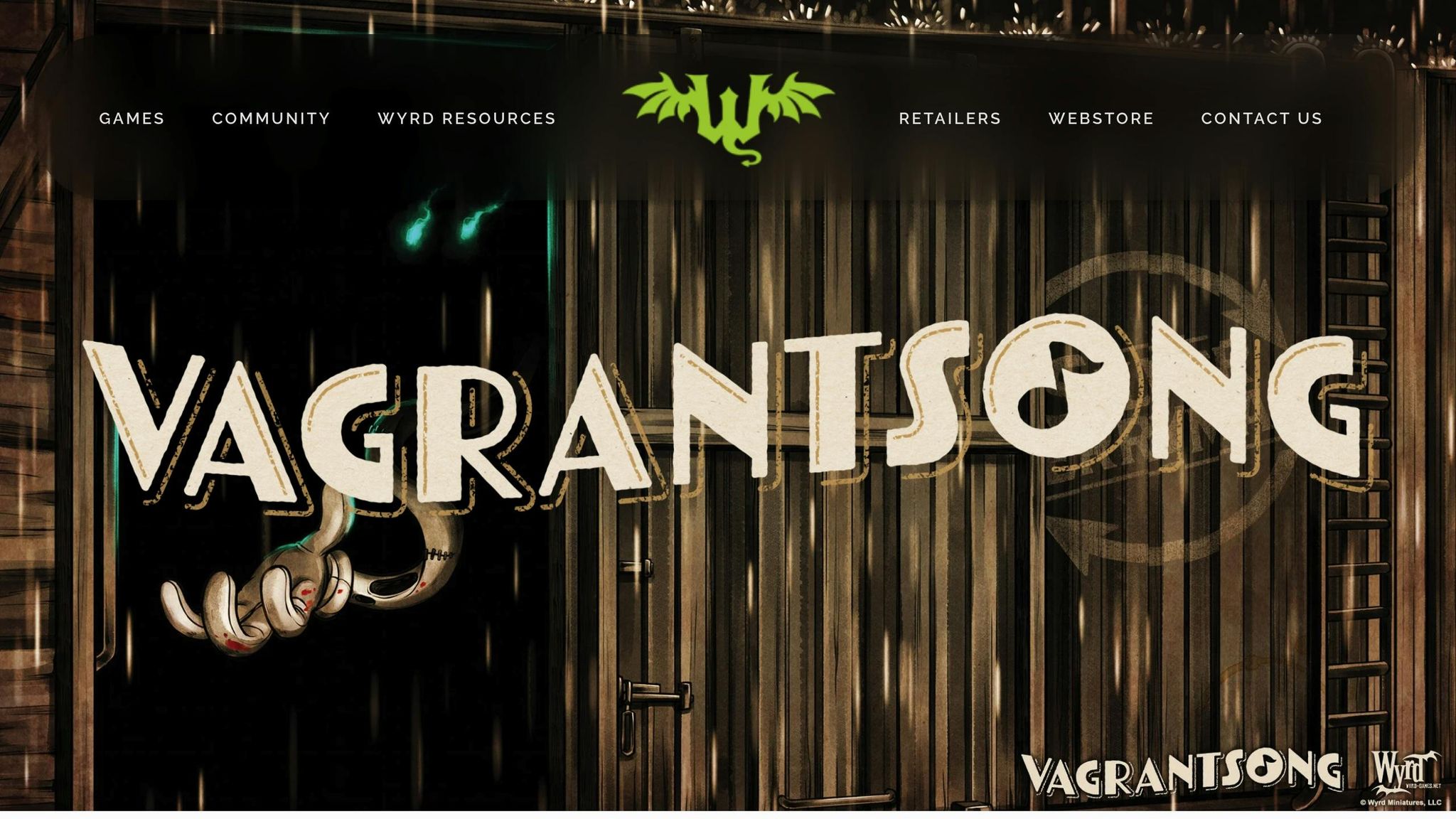
Set in Depression-era America, Vagrantsong takes an episodic approach to storytelling. Each chapter advances a larger mystery, with player choices influencing the tone and direction of future encounters.
As characters develop, flashback mechanics reveal pieces of their hidden pasts, adding depth and emotional weight to the narrative.
The Elder Scrolls: Betrayal of the Second Era

Inspired by its digital counterpart, The Elder Scrolls: Betrayal of the Second Era offers modular quests that branch into new narrative paths based on player decisions.
The game’s faction mechanics make alliances meaningful. Choosing one faction over another unlocks specific quests while closing off others, creating multiple paths to explore in future playthroughs. Environmental clues and richly detailed locations let players uncover the world’s history, capturing the essence of the Elder Scrolls universe in tabletop form.
Red Tape by MINIFINITI

While many games stick to tried-and-true methods of narrative-driven gameplay, Red Tape by MINIFINITI shakes things up with a fresh take. This political satire board game transforms the chaos of modern politics into a storytelling playground. It's a game that blends clever mechanics with sharp humor, offering a unique experience that still resonates with the immersive storytelling found in other top-tier games.
What sets Red Tape apart? Instead of building your own empire, the game flips the script with a reverse engine builder mechanic. Here, your goal isn’t to construct something grand - it’s to dismantle your opponents’ plans. This twist shifts the focus from creation to sabotage, making every move feel like a calculated political maneuver.
"Red Tape is the only board game that lets you indulge in political chaos by flipping traditional engine-building mechanics on their head, challenging you and your friends to outmaneuver each other with witty, snarky, and beautifully illustrated cards - all while embracing the humor and optimism hidden within the red tape of democracy."
The storytelling in Red Tape is enriched by its 100 uniquely designed cards, each brimming with creative names and fictional historical quotes. Players step into the shoes of politicians, using policy cards to enact plans, drawing "Departments" to introduce new rules, and generating red tape to bog down their rivals. The strategic bidding system, where "Senators" are used to control these Departments, keeps the gameplay dynamic. Alliances form and crumble, strategies shift, and players’ choices drive the unfolding story.
The game’s humor shines through its sharp political satire, encouraging players to embrace their "inner politician." Deal-breaking, backstabbing, and targeting opponents are not just allowed - they’re part of the fun. It captures the absurdity of bureaucracy while maintaining a lighthearted view of democracy. The ultimate goal? Be the last player standing who can still play policy cards, as everyone else drowns in a sea of red tape.
MINIFINITI takes the experience further with weekly game nights, fostering a sense of community among players. These events turn individual game sessions into larger shared experiences, where stories and rivalries carry over from week to week. At $39.99 for the prototype, Red Tape offers an affordable entry point into narrative-rich tabletop gaming, balancing strategic depth with social interaction.
Whether you're new to narrative board games or a seasoned player who enjoys sharp political commentary, Red Tape has something to offer. Its clever mechanics and engaging themes make it a standout choice for groups looking for a game that’s as strategic as it is entertaining. Up next, let’s see how its mechanics stack up against other games.
sbb-itb-7b84150
How These Games Compare
Choosing the right game for your group depends on the kind of storytelling experience you’re after. Each of these games brings something unique to the table, from sprawling fantasy campaigns to sharp, satirical scenarios.
Sleeping Gods and Gloomhaven stand out for their long, immersive campaigns where your decisions shape the narrative. If tactical, card-driven combat is your thing, Gloomhaven delivers. On the other hand, Sleeping Gods leans into open-world exploration, offering a sense of discovery at every turn.
Roll Player Adventures takes a different route by tying storytelling to character creation, making your hero’s backstory a pivotal part of the experience. Meanwhile, Vagrantsong focuses on a more contained narrative, blending tactical movement with a haunting, atmospheric setting.
For fans of The Elder Scrolls, Betrayal of the Second Era brings the beloved RPG universe to the tabletop. It combines familiar lore with interactive gameplay, offering faction dynamics and a chance to explore its rich world in a new way.
Then there’s Red Tape, which breaks away from fantasy entirely. With its reverse engine-building mechanics and biting political humor, it delivers a short but impactful experience centered on negotiation and strategic decision-making.
Here’s a quick look at how these games stack up:
Game Comparison Table
| Game | Narrative Depth | Campaign Length | Player Agency | Replayability | Social Focus |
|---|---|---|---|---|---|
| Sleeping Gods | Very High | Extensive campaign | High – open exploration | High – branching storylines | Cooperative storytelling |
| Gloomhaven | Very High | Extensive campaign | High – character progression | Very High – varied outcomes | Team-based combat |
| Roll Player Adventures | Medium-High | Moderate campaign | Medium – structured choices | Moderate – varied outcomes | Focus on character development |
| Vagrantsong | High | Moderate campaign | Medium-High – tactical choices | Moderate – diverse scenarios | Immersive atmosphere |
| The Elder Scrolls: Betrayal of the Second Era | High | Moderate campaign | High – faction dynamics | High – multiple paths | Blends competitive and cooperative play |
| Red Tape | Medium | Short game experience | High – political maneuvering | High – dynamic interactions | Emphasis on deal-making and negotiation |
These games highlight a variety of storytelling approaches. Titles like Sleeping Gods and Gloomhaven invite players into deep, narrative-rich campaigns, while games like Red Tape offer shorter, socially charged experiences that thrive on player interaction. Whether you’re drawn to cooperative storytelling or competitive deal-making, there’s something here for every kind of gamer.
Conclusion
Narrative-driven tabletop games have reshaped the concept of social gaming, turning ordinary game nights into immersive storytelling adventures. These games go beyond standard mechanics, offering shared experiences where every decision feels meaningful, and every session leaves behind unforgettable memories.
The diversity in storytelling styles means there’s something for everyone. Fans of epic campaigns will find themselves drawn to the expansive worlds of Sleeping Gods and Gloomhaven, where hours of exploration and decision-making await. On the other hand, players who prefer shorter, more contained experiences can enjoy games like Red Tape, which delivers a powerful story in just one session through clever mechanics and engaging social dynamics. This variety not only caters to different preferences but also enhances the communal aspect of play.
What sets these games apart is their ability to adapt to different group dynamics while strengthening social bonds that often extend beyond the game itself. Groups who love cooperative storytelling will enjoy the shared journey in Sleeping Gods, while those with a competitive streak can dive into the faction-driven intrigue of The Elder Scrolls: Betrayal of the Second Era. For character-focused players, Roll Player Adventures offers a chance to weave personal backstories into a larger narrative, creating a deeper connection that lasts well beyond the session.
This kind of engagement fosters a sense of community that’s hard to find in other forms of entertainment.
Whether your taste leans toward fantasy, horror, or even political satire, narrative-driven tabletop games offer something for every kind of storyteller. They show us that the most meaningful gaming experiences come from creating stories together. In a world dominated by digital interactions, these games remind us of the joy in gathering around a table and embarking on adventures side by side.
FAQs
What should I consider when picking a narrative-driven tabletop game for my group?
When picking a narrative-driven tabletop game, it's important to start with the basics: your group's size and how much time you typically have for each session. Choose a game that fits both the number of players and your usual schedule. This way, everyone can stay involved and enjoy the experience without feeling rushed.
Next, consider how the game mechanics support storytelling and interaction. Games with well-thought-out systems for character growth, immersive plots, and teamwork tend to create a more engaging experience. Lastly, think about what your group enjoys most - whether it’s deep, emotional stories, strategic problem-solving, or lively social interactions. Picking a game that matches their tastes will ensure everyone has a great time.
How does replayability make narrative-driven tabletop games more enjoyable?
Replayability brings incredible depth to narrative-driven tabletop games, giving players the opportunity to dive into different storylines, experiment with fresh decisions, and uncover shifting plot twists. This variety keeps the experience engaging, drawing players back to the table time and time again.
With alternate outcomes and ever-changing narratives, these games spark a stronger emotional connection and a sense of adventure. This doesn’t just make the game last longer - it also boosts the fun, ensuring every playthrough feels distinct and memorable.
How do narrative-driven tabletop games help players connect and build a sense of community?
Narrative-driven tabletop games have a unique way of bringing people together. They encourage teamwork, storytelling, and shared experiences, creating an environment where players collaborate to solve challenges, make decisions, and dive into immersive stories. This naturally sparks communication and strengthens connections among participants.
These games also open the door to meaningful interactions, helping players sharpen social skills like cooperation, active listening, and respecting different perspectives. The shared experience of crafting a story often leads to lasting friendships and a sense of belonging, making them an excellent way to build and nurture communities.